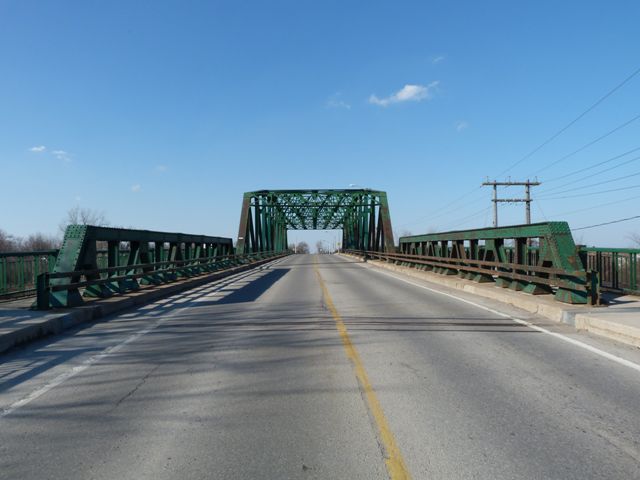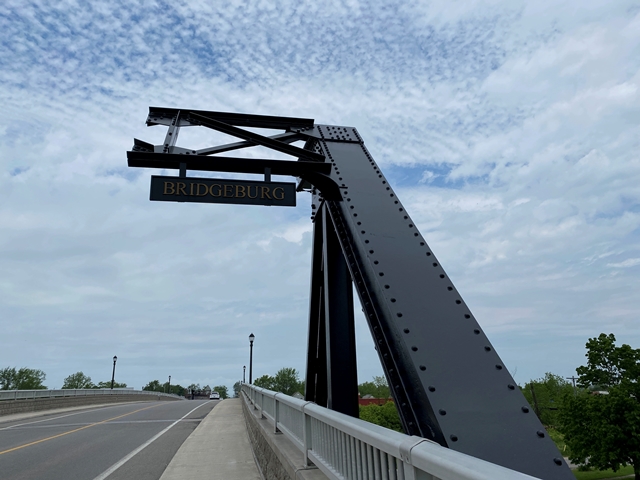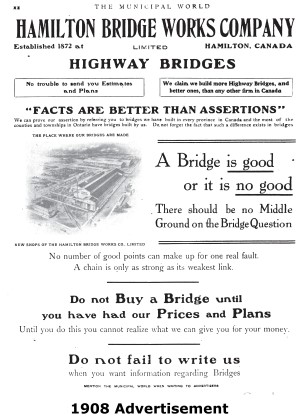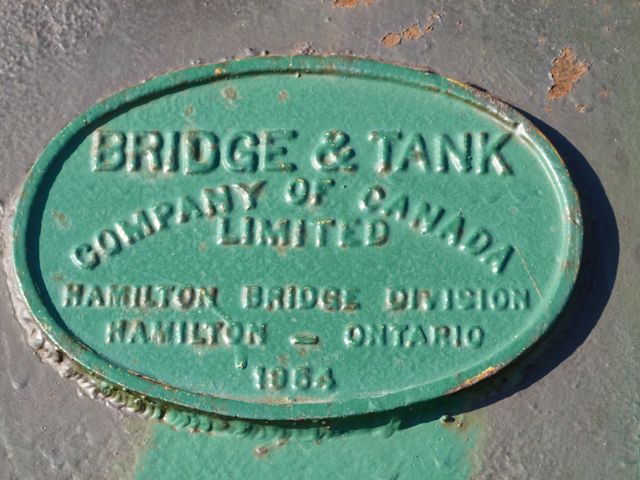We Recommend:
Bach Steel - Experts at historic truss bridge restoration.
BridgeHunter.com Phase 1 is released to the public! - Visit Now
Central Avenue Bridge

Primary Photographer(s): Nathan Holth
Bridge Documented: March 20, 2012
Fort Erie: Niagara Region, Ontario: Canada
Metal 10 Panel Rivet-Connected Parker Through Truss, Fixed and Approach Spans: Metal 6 Panel Rivet-Connected Warren Pony Truss, Fixed
1955 By Builder/Contractor: Hamilton Bridge Company of Hamilton, Ontario and Engineer/Design: C.R. Hagey Engineering Associates of Fort Erie, Ontario
Not Available or Not Applicable
204.0 Feet (62.2 Meters)
417.0 Feet (127.1 Meters)
30 Feet (9.14 Meters)
1 Main Span(s) and 4 Approach Span(s)
Not Applicable

View Information About HSR Ratings
Bridge Documentation
This bridge no longer exists!
Bridge Status: This bridge was demolished and replaced ca. 2016.View a document from Niagara Region describing the planned replacement project and considered alternatives.
This bridge is a large viaduct that carries Central Avenue over four railroad tracks and Lewis Avenue. The length of the bridge proper from abutment to abutment is 417 feet (127.2 meters), but if the long approach system, , is included the length jumps to a very impressive 1007.5 feet (307.1 meters). The approach system appears to be composed of an earthen-filled ramp contained within concrete retaining wall panels. The bridge itself is composed of a through truss span of 204 feet (62.1 meters) that carries the road over the railroad tracks, a pony truss span of 76 feet (23.2 meters) that carries the roadway over Lewis Street, and three deck plate girder spans totaling 137.5 feet (41.9 meters). The bridge retains outstanding historic integrity with no major alterations noted. Original standard Ontario ornamental railings remain on both the bridge and the approach system. Plaques also remain on the bridge.
Henry Hagey provides a detailed description of the consulting engineer for this bridge, Charles Ralph Hagey as well as the photo seen below. Charles Ralph Hagey was a prominent engineer in Ontario who was born March 30, 1893 and died February 14, 1961. His firm, C.R. Hagey Engineering Associates of Fort Erie was the consulting engineer for the Central Avenue Bridge. Like many engineering firms, the name changed over time, and an earlier name of the firm was Hagey and Gray Engineering, and the original name was Ontario Engineering Company, which he formed in 1927 together with Maxim T. Grey. Hagey was associated with other significant engineering projects including the Peace Bridge as well as being a consultant for the construction of the Canadian side of the Niagara Falls Rainbow Bridge in 1939-41.

The builder of the superstructure was Bridge and Tank Company of Canada, which was the name that the prolific and long-lived Hamilton Bridge Company was using at the time this bridge was constructed. The Hamilton Bridge Company was known by several different names throughout its history. For consistency, HistoricBridges.org lists the builder name for all bridges built by this company by its most common name, Hamilton Bridge Company.
The on-site contractor for the bridge was Cameron and Phin of Welland, Ontario. This firm was known as Maguire, Cameron and Phin, since this is the name cited when they did work on Welland's Main Street Bridge in 1929-1931. Cameron and Phin reportedly went out of business in the 1970s.
This bridge is historically and technologically significant as a large, unaltered example of mid-20th Century bridge engineering. It is also noteworthy for its association with local engineers and contractors. It also is an example of a significant and rapidly disappearing bridge type, the metal truss bridge. The bridge is also visually a local landmark, with its significant approaches and uncommon combination of truss span types. The trusses themselves are visually pleasing and more interesting to look at than any modern bridge.
Despite the visual and heritage value of this bridge, demolition and replacement was the fate of this bridge. The demolition of this bridge continues the trend of rapid and widespread demolition of bridges with heritage value in Ontario. The overall condition of this bridge did not appear to be very bad, and rehabilitation was certainly feasible for this bridge. It would have been nice to see demolition plans halted and a preservation plan developed for this bridge. A small section of the heritage truss bridge was placed on the replacement bridge as shown below, courtesy of Ed Blasinski.

![]()
Photo Galleries and Videos: Central Avenue Bridge
Structure Overview
Original / Full Size PhotosA collection of overview photos that show the bridge as a whole and general areas of the bridge. This gallery offers photos in the highest available resolution and file size in a touch-friendly popup viewer.
Alternatively, Browse Without Using Viewer
![]()
Structure Details
Original / Full Size PhotosA collection of detail photos that document the parts, construction, and condition of the bridge. This gallery offers photos in the highest available resolution and file size in a touch-friendly popup viewer.
Alternatively, Browse Without Using Viewer
![]()
Structure Overview
Mobile Optimized PhotosA collection of overview photos that show the bridge as a whole and general areas of the bridge. This gallery features data-friendly, fast-loading photos in a touch-friendly popup viewer.
Alternatively, Browse Without Using Viewer
![]()
Structure Details
Mobile Optimized PhotosA collection of detail photos that document the parts, construction, and condition of the bridge. This gallery features data-friendly, fast-loading photos in a touch-friendly popup viewer.
Alternatively, Browse Without Using Viewer
![]()
Maps and Links: Central Avenue Bridge
This historic bridge has been demolished. This map is shown for reference purposes only.
Coordinates (Latitude, Longitude):
Search For Additional Bridge Listings:
Additional Maps:
Google Streetview (If Available)
GeoHack (Additional Links and Coordinates)
Apple Maps (Via DuckDuckGo Search)
Apple Maps (Apple devices only)
Android: Open Location In Your Map or GPS App
Flickr Gallery (Find Nearby Photos)
Wikimedia Commons (Find Nearby Photos)
Directions Via Sygic For Android
Directions Via Sygic For iOS and Android Dolphin Browser




